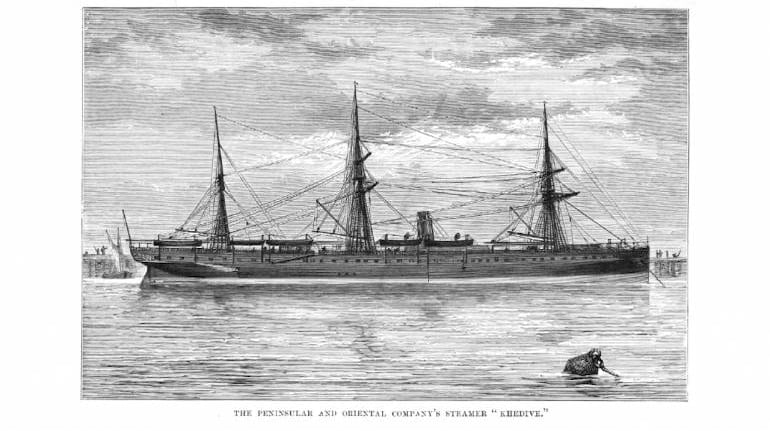



Almost 300 years ago, India was the hotbed of high-quality ship-building. Surat was a thriving port. Ships made in Surat were considered to be superior to the British in terms of durability and strength. Within a span of 100 years, the ship-building capability in India had been eroded significantly. Technological progress as well as the opening of the Suez Canal meant that steam ships were preferable in which the British developed a distinct advantage. The British ruled the seas. It is estimated that by 1890, 50 percent of the world's tonnage was on British-owned vessels.
India was under the control of the British and their merchants were dependent on British ships for their sea-bound trade. The two key commodities exported were opium and cotton. There was an open cartel running the ships in that era. It was led by the British Peninsular and Oriental Steam Navigation Company (P&O) which had a monopoly on the eastern shipping market.
They charged high fixed rates as well as control on the quantity that could be transported. The terms were unfavourable, but Indian merchants had little choice. One of those entrepreneurs was Jamsetji Tata – the founder of the Tata Group. He had complained over the steep freight rates charged by the P&O for the transportation of cotton yarn produced by his mills. The complaint was ignored.
He tried to take on P&O with the support of two foreign shipping lines – one Italian and one Austrian. That support didn’t last long as the two shipping companies later joined forces with P&O and thereafter raised their charges. In 1893, he proposed a joint venture with a Japanese company Nippon Yusen Kaisha (NYK). Japanese players had started importing raw cotton from India only in 1889 and had witnessed the unfavourable terms for shipping.
Hence, when Jamsetji Tata made the offer of a JV for a new shipping line with NYK, it worked. Three Japanese spinning companies even guaranteed the import of 50,000 bales of raw cotton every year from India. A new line was then formed: Tata Line. It comprised four ships of which two were chartered from England and the other two were rented from NYK. The line planned to transport cotton and opium for merchants. Until then, P&O had maintained a dominant right to ship the drug.
The pricing started by the Tata Line was meaningfully lower than that of the P&O. It charged INR 12-13/ton in comparison to the P&O rate of INR 18-19/ton. Indian millowners who had been dismayed by the steep freight rates were delighted with the entry and pricing of the Tata Line. But the war had only just begun. P&O slashed its rates to INR 5/ton and a few months later to only INR 1.5/ton. Such rates were offered to clients on the condition that they would not use the services of the Tata Line.
In addition to the price war, a credibility war was also initiated. Author Mircea Raianu in the book Tata: The global corporation that built Indian capitalism points out that Tata’s fellow Bombay millowners abandoned Tata after anonymous letters were circulated that highlighted that Tata Line was started to give Tata & Co preferential treatment in the cotton trade.
Even the assets of the Tata Line were put up for question by the P&O. In the Tides of Time, M.V. Kamath writes that “P&O started a campaign of maligning the sea-worthiness of Tata ships which impacted their insurance. Tata threatened to take P&O to court and the company had to apologize.”
Eventually Tata opted to take the matter to the political and administrative level. It didn’t yield any results. The administration responded that the price war was a business matter between private players.
Tata wrapped up its operations in 1895 after sustained losses. The Japanese partner NYK, however, continued by adding more of its vessels to the route. The battle was to soon become a friendship. Shigeru Akita in the Asian Review of World Histories refers to P&O moving towards a compromise formula with NYK to address the price war. Even the British Foreign Office got involved. An agreement was finally reached between P&O, NYK, the Italian and Austrian carrier. A new tariff of INR 12/ton on Indian cotton was set – the rate initially charged by Tata Line. Tariff income was to be distributed with 50 percent going to P&O and 23 percent to NYK.
In a way, even in defeat, Jamsetji Tata set the stage for higher competition in the seas and lower tariffs for the Indian merchants.
Discover the latest Business News, Sensex, and Nifty updates. Obtain Personal Finance insights, tax queries, and expert opinions on Moneycontrol or download the Moneycontrol App to stay updated!
Find the best of Al News in one place, specially curated for you every weekend.
Stay on top of the latest tech trends and biggest startup news.